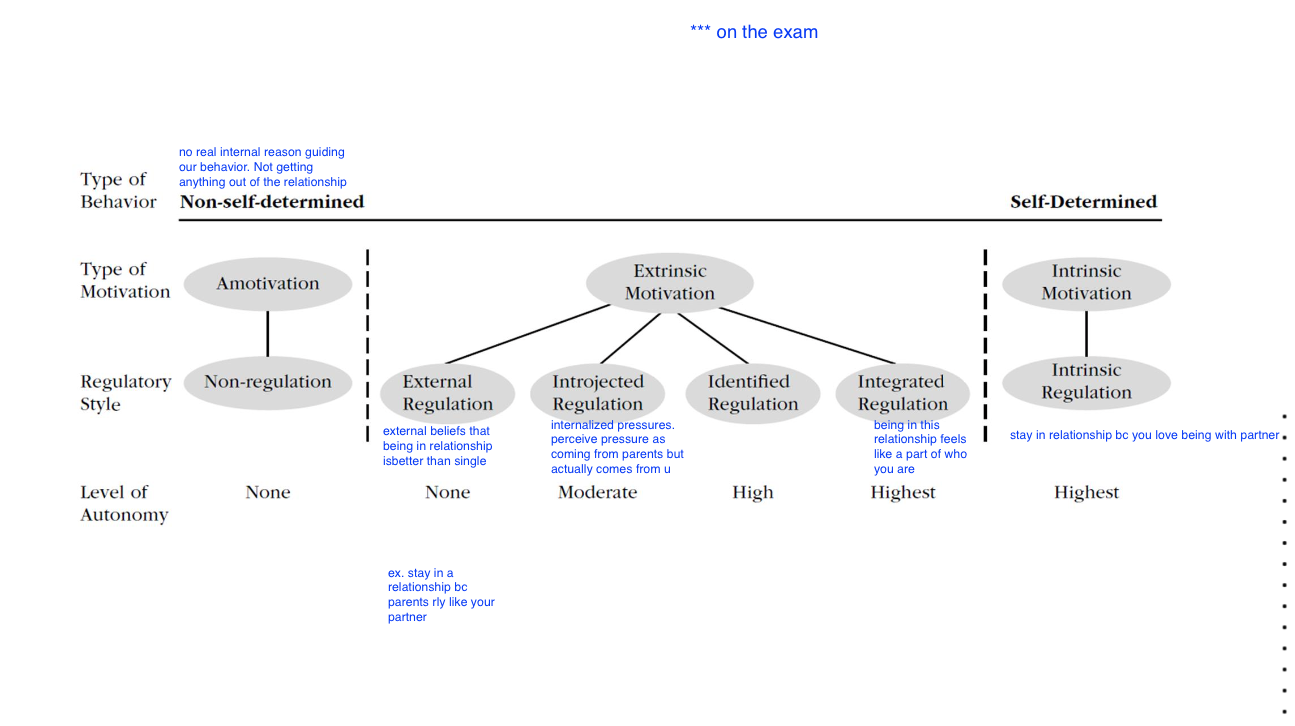self-determination in close relationships
1/15
There's no tags or description
Looks like no tags are added yet.
Name | Mastery | Learn | Test | Matching | Spaced | Call with Kai |
|---|
No analytics yet
Send a link to your students to track their progress
16 Terms
self-determination continuum chart

relational benefits of autonomous motivation
higher levels of autonomous motivation for being in a relationship is associated with higher relationship satisfaction
ex. research couples living together. the ones that were there bc they wanted to be there, showed higher satisfaction
autonomy orientation
autonomy-orientation
trait-level tendency to regulate behaviour based on personal values and interests rather than external pressure
associated with growth and mastery orientation in oneself and others
related to less defensiveness to interpersonal differences with partner (conflict is less threatening)
less desire for a partner exactly like oneself
more positive communication during conversations designed to highlight relationship disagreements
“we’re different, what can I learn from this”
people more autonomy oriented are less rigid about needing their partner to be exactly like them
what does relationship autonomy foster
a pro-partner orientation
higher levels of responsiveness and encouragement of partner’s independent goals and successes
higher levels of forgiveness following partner transgression
more constructive responses to relationship conflict
ex. raising concerns, collaborative problem solving
less destructive coping
ex. avoiding issues, withdrawing emotionally, lashing out
event-specific autonomous motivation
Level of autonomous motivation also varies at the level of specific relationship activities
Autonomous motivation for engaging in activities like self-disclosure, support provision, and physical intimacy predicts greater relationship satisfaction and quality (must not feel controlled)
Autonomous motivation for caregiving for a partner with chronic health condition (e.g., cancer, chronic pain) predicts lower levels of depression & psychological distress, and more life satisfaction
communal strength
how motivated someone is to care for their partner’s needs willingly and without expecting immediate payback
individuals high in this report more positive emotions, feelings of appreciation, and higher relationship satisfaction when making sacrifices
mediated by authenticity
authenticity
Sacrifice feels good when its authentic, freely chosen and meaningful
authenticity and emotional suppression
emotional suppression usually has negative effects (lower well-being, lower feelings of interpersonal connection & authenticity)
for people who feel highly interdependent with their partner (see partner as part of the self), suppressing negative emotions during sacrifice boosts well-being and relationship satisfaction
suppression feels authentic for these individuals because it aligns with their genuine desire to prioritize the relationship
people who feel less interdependent, suppression during sacrifice leads to lower well-being & relationship quality
daily diary study: asks whether they sacrificed smt for their partner + the suppression, satisfaction they felt with partner
unmitigated communion
over-prioritizing a partner’s needs at the expense of your own, often driven by guilt, fear, or low self-esteem (controlled motivation)
daily diary study of sexual motivation
sexual communal strength → more autonomous reasons for having sex → higher sexual satisfaction + desire, immediately and over time
unmitigated sexual communion→ more controlled reasons for having sex → lower and declining satisfaction over time
psychological need fulfillment
boosts both personal and relationship well-being
relatedness= strongest predictor of relationship quality, but autonomy and competence make unique contributions
helps recover following conflict
need fulfillment→ greater autonomous motivation → higher satsifaction & commitment post-conflict
the psychological needs as related to relationships
autonomy: choosing to be in the relationship, expressing true self
competence: feeling capable and effective when with partner, confidence in navigating problems together
relatedness: feeling loved, valued, care for (strongest link to relationship)
need frustration in relationshionships
need frustration is linked to a fragile, highly contingent (tied to success and failure) form of self-esteem
conditional regard threatens both autonomy and healthy self- esteem
both CPR and CNR predict lower average relationship satisfaction over time
CPR may feel satisfying in the short term but still damages autonomy and relationship quality in the long run
autonomy + relatedness
complementary forces in shaping healthy relationships
ex. relatedness predicts better conflict responses—but only when partners also autonomous
proposed mechanism — autonomy lowers ego-involvement
when autonomy needs are met, people are less defensive and focused on protecting self-image during conflict
can hear feedback without feeling personally attacked
when autonomy is low, more likely to interpret conflicts as threats to their worth and get defensive
any negative behavior is judged as a threat. Relatedness on its own is not enough
mutual need fulfillment
Couple studies show that both partners’ levels of need fulfillment make unique contributions to individual outcomes—relationship satisfaction, commitment, attachment security, conflict resolution
I.e., your well-being depends not only on your own need fulfillment, but your partner’s as well
even if your partner is meeting your needs, you wont feel as happy if you’re not meeting all of theirs
importance of gratitude
Partner regulation: attempts to get partner to change behaviours, habits, or attitudes
Even well-intentioned, can feel threatening to person on receiving end
Negative emotions might spark short-term compliance, but need autonomous motivation to sustain long-term change
When partners perceived more gratitude for their efforts:
They reported greater autonomous motivation to keep working on the requested change
They and their partners reported greater success in actually making and sustaining the change
**lasting change comes from when someone changes because they want to. How can you do this? Taking their perspective, use invitational language, choice, and gratitude